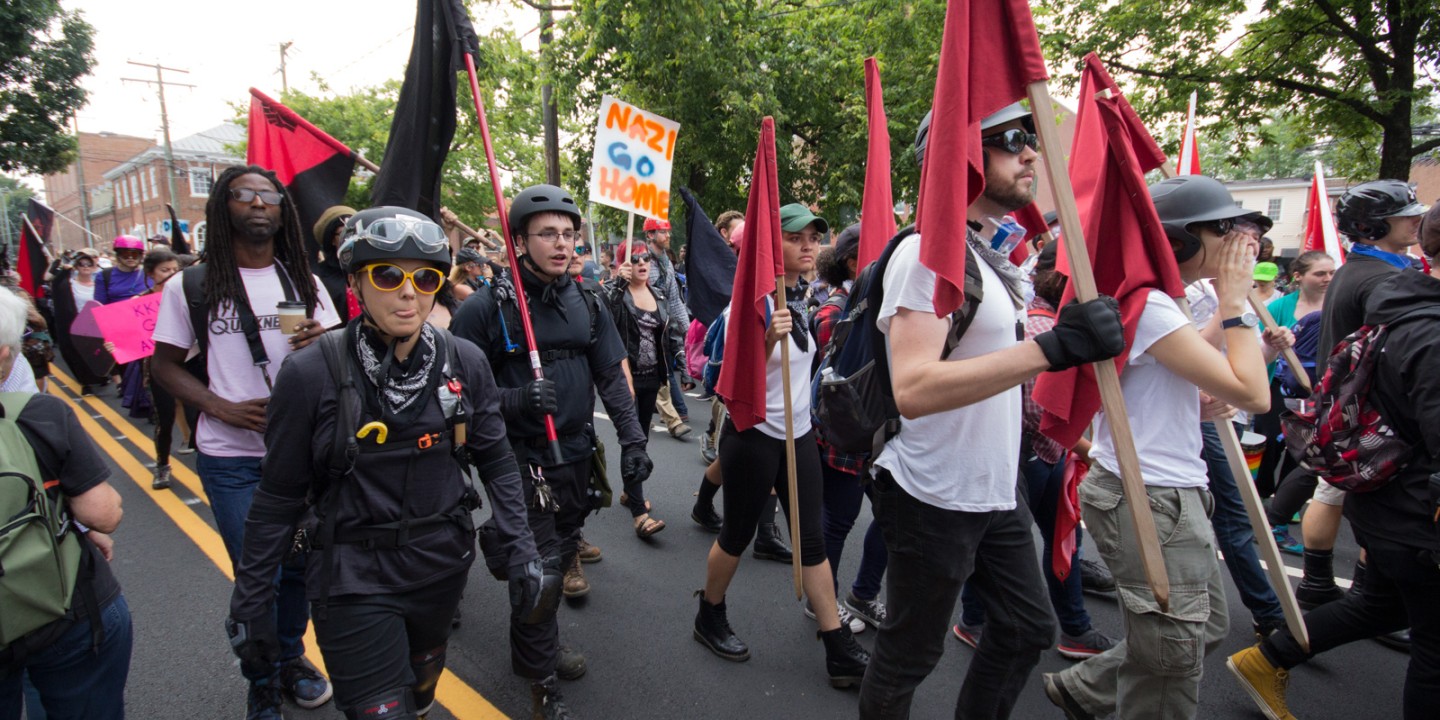Are we of any use in the fight against racism?
I used to be cautious about partnerships with people who don’t share my faith-based commitment to nonviolence. Now I’m not so sure.

Two years ago I wrote a book about Christian political engagement that concluded, in part, with an argument for Christians being cautious about forging partnerships with non-Christian groups. I worried in Kingdom Politics about churches being used for a foreign agenda or sacrificing their distinctive witness for some flattened, universalized notion of the “common good.”
Then Charlottesville happened. Having lived there for seven years, I returned to the city in August along with other clergy to bear witness and resist the hate swelling its streets. Nearly every white supremacist I saw was equipped with shield, helmet, and club. They came ready and eager for battle.
Local anti-racist groups agreed to allow clergy to form the first wave of nonviolent resistance; Antifa, the black-clad antifascist activists who often employ violence as a tactic of resistance, would follow. When police stood idle during the moments of confrontation with the white supremacists, and when clergy lives were threatened by a white nationalist horde amped up on a cocktail of fear and rage, Antifa activists offered protection. Antifa and Christian clergy were intermingled. We shared communication devices and we shared safe space.
That experience has prompted me to rethink the question about coalitions. I wonder if my concerns for the distinctiveness of the church might limit the church’s ability to be faithful to its mission. Might a concern for protecting one’s identity lead one to abandon the front lines of the struggle—and those who cannot escape its danger? I am haunted by the question Dietrich Bonhoeffer asked from a Nazi prison cell to his fellow Confessing Church pastors, “Are we still of any use?”
I remain a pacifist. I believe that Christians should not utilize violence, nor condone its use by others. But ad hoc partnerships, like the one that occurred between clergy and Antifa in Charlottesville, are likely to arise. Those are situations in which we must rely on the Spirit’s guidance, and perhaps, forgiveness.
At the very least, if we claim nonviolence as a Christian virtue, we must be ready to put that to the test, ready to put our bodies on the line in nonviolent witness to Christ’s peace and love. And, most important, those of us who condemn violence in the name of Christ but are largely shielded by our skin color from risk of harm must be slow to speak and quick to listen to those who have much more at stake.
Theologian Willie Jennings has persuasively argued for the Christian origins of modern racism. According to Jennings, white supremacy emerged as the church set out on its colonizing mission during the period of European exploration and discovery. When Europeans encountered the native inhabitants of Africa and America, their missionary impulses to simultaneously evangelize and conquer contorted their theology into a device to rationalize their new conquests and subjugation of their darker-skinned inhabitants.
To ask, “Are we still of any use?” in a time when the church must reckon with its own complicity in and support of white supremacy means that now is a time for white Christians to be vulnerable, to question “the way we have always done things,” to admit our mistakes and express a willingness to change our minds. White Christians must unequivocally admit the painful truth that white supremacy is a Christian invention, and then repent for the ways we contribute to a culture of white supremacy that does not end when the rally concludes or statues come down. White supremacy doesn’t require displays of hatred like in Charlottesville, just the willingness to benefit from the privilege it confers; simply denouncing it is not enough. And while this means that it is our responsibility to resist white supremacy, we cannot do this alone. We’ve gotten the world into this mess and we need its help to get us all out.
The struggle against white supremacy will mean forming coalitions across religious and political communities. Alliances with Muslims and Jews, atheists and anarchists, may be difficult and complex. But Christians need partnerships not only to protest and plan marches but also for the grueling daily work of racial justice: seeking criminal justice and immigration reform, police accountability, education equality.
In many cases this work will compel us to discover “church” in unlikely places and allies in unlikely people. Sam Wells wrote, “If we feel the church is weak, it’s because we’ve limited what we’re looking at when we use the word church.”
On the day of the Charlottesville rally, clergy and anti-racist protesters found a safe haven in a bar. The rainbow flags hanging in the windows made it a potential target for the armed white gangs still roaming the streets after the rally was dispersed. For the owner and his same-sex partner, this act of hospitality was their act of defiance. For those needing safety, it was a welcome offering.
The owner opened his doors as sanctuary for Christian clergy—a category of people he would have every reason to suspect. He brought us a buffet of food and poured pints of beer as real-life Nazis marched outside. Inside was a coalition of people of faith and no faith; black, white, and brown; gay and straight. We broke bread and shared a cup, bonded by our common resistance to a message of hate. We were a motley, beloved community of love and hope.





